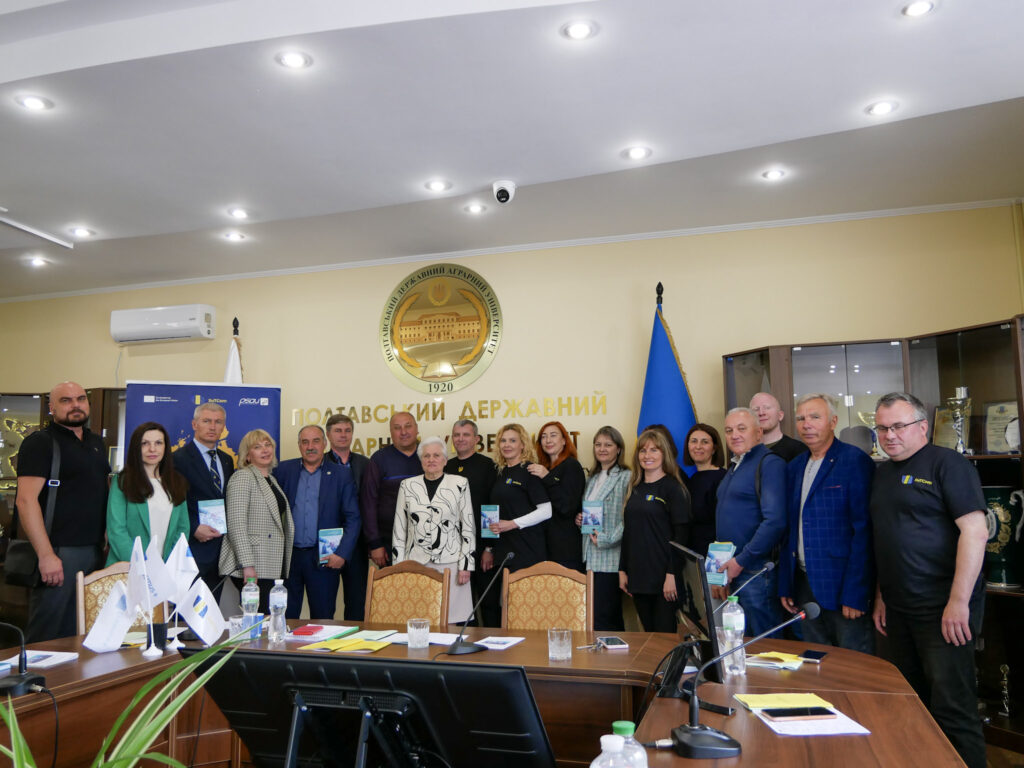Round Table “Citizen Participation and Social Dialogue as Key Factors in the Development of Sustainable Territorial Communities” and Seminar-Training “The Role and Place of the Institution of Elders in the Development of Sustainable Territorial Communities” (20.05.2025, Poltava)
On 20 May 2025, Poltava State Agrarian University held a roundtable discussion ‘Citizen participation and social dialogue as key factors in the development of sustainable territorial communities’ and a training seminar ‘The role and place of the starosta institute in the development of sustainable territorial communities’. The event was held within the framework of the European Union Erasmus+ Jean Monnet project “Citizen participation and social dialogue as key factors in the development of sustainable territorial communities: EU best practices for Ukraine” / № 101085535 — SuTCom — ERASMUS-JMO-2022-HEI-TCH-RSCH.
On 20 May 2025, Poltava State Agrarian University held a roundtable discussion ‘Citizen participation and social dialogue as key factors in the development of sustainable territorial communities’ and a training seminar ‘The role and place of the starosta institute in the development of sustainable territorial communities’. The event was held within the framework of the EU Erasmus+ project Jean Monnet Chair.
Rector of PSAU Oleksandr Halych, Chair of the Academic Council of PSAU Valentyna Aranchiy, Vice-Rector for Academic Affairs and International Relations Oleg Gorb, and project coordinator Anastasiia Nekriach delivered welcoming remarks. They emphasised the strategic role of the university in local government processes, the importance of the educational environment in training qualified specialists, and the prospect of expanding research initiatives.
The event was attended by representatives of business, the academic community, students and local community leaders, among others: Viktor Dubovych ( head of Nekhvoroshchanska TC), Olha Khomenko (deputy head of Nekhvoroshchanska TC), Volodymyr Omelchenko ( head of Liutenska TC), Ivan Kudinov (starosta of Berezovolutskyi starosta district of Petrivsko-Romenskyi TC), Valentyna Piddubna (manager of the executive committee of Karlivka City Council), Valentyn Sobokar (deputy head of Tereshky village council), Yulia Sokyrnia (representative of the executive committee of economic development of the Kotelivka settlement council), Valerii Bilokon ( head of Machukhivska TC), Yevhen Bova (village head of Novoselivska TC), Vyacheslav Oliynyk ( head of Velykorublivska TC), Hennadii Suprun ( head of Novosanzharska TC).
The event presented scientific and practical developments in the field of local self-government. Tamara Sharavara presented the textbook ‘Local Self-Government in Central and Eastern Europe: Political Profile’, and Svitlana Makarets presented the manual ‘Self-Education in Communities’. In addition, Tamara Sharavara and Serhiy Prykhodko presented information and methodological materials, including a roadmap for the development of amalgamated communities in Poltava Oblast.
The roundtable discussed issues of cooperation between business and local communities. Kateryna Kolubai, Head of Ethics and Values at Vygidna Pokupka LLC (Aurora Multimarket), spoke about business participation in social initiatives and youth entrepreneurship support programmes such as «Trajectory» and «Support for Veterans».
During the training seminar, Anastasiia Nekriach and Tamara Sharavara discussed the role of the starosta institute in the development of sustainable territorial communities, analysing domestic and European experience.
The final stage was a panel discussion on ‘Local Self-Government in Ukraine in the Current Conditions of Functioning’. It was attended by a ‘group of opinion leaders’ (active young people – project participants), representatives of the public, business and entrepreneurial spheres, as well as local authorities. This made it possible to share experiences, discuss current challenges, and identify further steps to strengthen local self-government in Ukraine.
An important issue was the feasibility of an ombudsman institution in local communities. Participants discussed its role in ensuring citizens’ access to justice and mechanisms of public control.
This event facilitated the exchange of experience between representatives of the academic community, government and business, as well as expanded opportunities for the development of effective models of governance and social interaction in territorial communities.
Prepared with the use of materials of the Poltava State Agrarian University.

